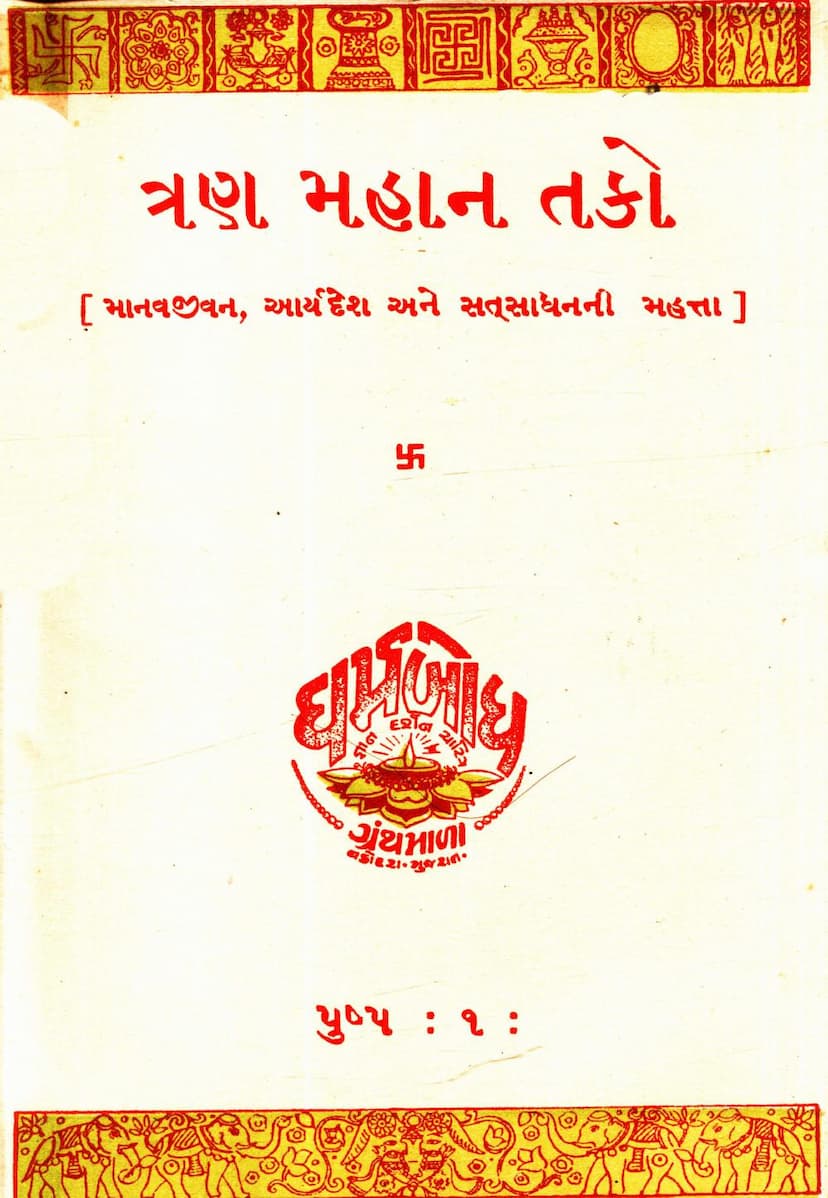Tran Mahan Tako
Added to library: September 2, 2025

Summary
This Jain text, titled "Tran Mahan Tako" (Three Great Opportunities), authored by Dhirajlal Tokarshi Shah and published by Muktikamal Jain Mohan Granthmala, is a philosophical discourse aimed at guiding individuals towards a meaningful and spiritually fulfilling life within the Jain tradition. The book is presented as the first "flower" of the "Dharmbodh Granthamala" series.
The core message of the book revolves around identifying and capitalizing on three crucial opportunities available to every human being:
-
Human Life (Manushya Bhav): The text emphasizes the immense rarity and value of obtaining a human birth. It contrasts humans with animals, highlighting the unique possession of intellect and the capacity for reasoning as the distinguishing factor that elevates humans. The book stresses that this intellect, if used for discerning right from wrong (hit and ahit), can lead to spiritual progress. It warns against wasting this precious life through ignorance and indulgence, comparing it to a shepherd boy mistaking a diamond for mere glass. Through various analogies and stories, the author illustrates how easily this opportunity can be squandered, leading to immense regret. The core argument is that human life is the sole opportunity to break free from the cycle of birth and death (samsara) and achieve liberation (moksha).
-
Arya Desh (The Land of the Aryas): This section discusses the importance of being born in or having access to an "Arya Desh" – a land where the principles of Jainism are understood, practiced, and supported. The text defines "Arya" not just by birth or lineage, but by virtuous conduct, adherence to righteous principles, and the pursuit of spiritual knowledge. It contrasts these "Arya lands" with "Anarya lands" where such opportunities are scarce. The book elaborates on different categories of "Arya," including those possessing spiritual wealth (riddhi), and those who are "Arya" by region, lineage, action, craft, or language. It further categorizes them into those with "Darshan-Arya" (right perspective), "Gnan-Arya" (right knowledge), and "Charitra-Arya" (right conduct). The text strongly advocates for utilizing the conducive environment of an Arya Desh for spiritual growth, underscoring the rarity of such circumstances.
-
Satsadhan (Right Means/Tools): This part of the book focuses on the practical means and practices that facilitate spiritual progress. It argues that understanding the value of these means comes from experiencing their absence or from contrast. The narrative of Kinkardas, a poor merchant, illustrates how one's circumstances are often more favorable than perceived, especially when compared to those in "Anarya lands" or even those with physical ailments. The author encourages individuals to utilize their time effectively, even in seemingly busy lives, by dedicating portions of their day to spiritual practices. The text outlines eight key practices that contribute to spiritual well-being:
- Pujya Puja (Worship of the Venerable): Showing reverence to the Tirthankaras, their teachings, and virtuous individuals.
- Daya (Compassion): Practicing non-violence and kindness towards all living beings.
- Dan (Charity/Giving): Generously sharing what one has for the welfare of others, especially the needy and spiritual aspirants.
- Tirth Yatra (Pilgrimage): Visiting sacred places to imbibe their spiritual atmosphere.
- Japa (Chanting): Reciting sacred mantras, particularly the Panch Parmeshthi Namaskar mantra.
- Tapa (Austerity/Penance): Practicing self-discipline and renunciation through fasting, reduced consumption, and other forms of austerity.
- Shrut (Scriptural Study): Regularly studying and reflecting upon religious scriptures.
- Paropkar (Altruism/Service to Others): Engaging in acts of selfless service and working for the benefit of others.
The book concludes by reiterating that these three opportunities – human life, birth in an Arya Desh, and the availability of right means – are invaluable and rare. It urges readers to make the most of them to achieve ultimate spiritual liberation and a life of true happiness and fulfillment. The text emphasizes that true "Aryatva" lies not in external factors but in internal virtues like self-control, compassion, introspection, and purity of life.